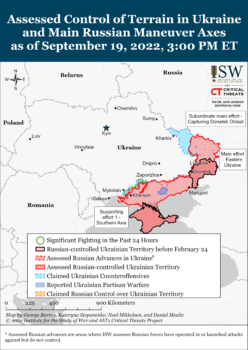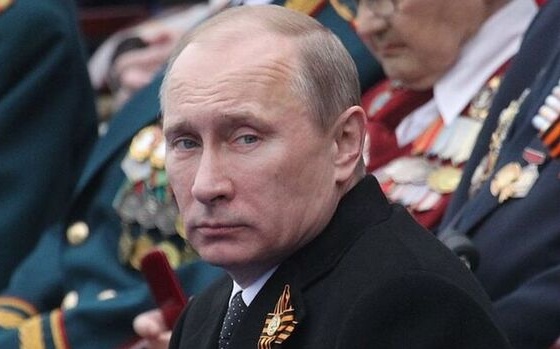Vladimir Putin in Moscow’s Red Square on Victory Day, May 9, 2022
Jump to Original Entry
Thursday’s Coverage: Zelenskiy’s 5-Point “Formula for Peace” at the UN

Source: Institute for the Study of War
UPDATE 1558 GMT:
Finland will “significantly restrict the entry of Russian citizens” after an exodus by Russians to neighboring countries following Vladimir Putin’s “partial mobilization”.
orders.
Finland was the last EU country that still accepted Russians with tourist visas.
“The fear is that we end up being the only border country through which it’s possible to travel from Russia to Europe with a Schengen visa granted by another country,” Finland Foreign Minister Pekka Haavisto said on Wednesday.
Russian men of military age are trying to leave the country to avoid call-up to the frontline in Ukraine. Some are waiting more than 24 hours at border. On the frontier with Georgia, men used bicycles and scooters to bypass miles of traffic jams.
UPDATE 1536 GMT:
UN investigators have concluded that Russian forces committed war crimes in Ukraine, including bombings of civilian areas, executions, torture, and sexual violence.
The team of three experts updated the Human Rights Council on initial investigations in the Kyiv, Chernihiv, Kharkiv, and Sumy regions in north and northeast Ukraine. They visited 27 towns and settlements, graves, and detention and torture centres; interviewed more than 150 victims and witnesses; and met with advocacy groups and government officials.
Erik Mose, the head of the team, said they were especially “struck by the large number of executions in the areas that we visited”, and the frequent “visible signs of executions on bodies, such as hands tied behind backs, gunshot wounds to the head, and slit throats”. Investigators had also received “consistent accounts of ill-treatment and torture, which were carried out during unlawful confinement”.
In the Kyiv-area settlements of Bucha, Hostomel, and Borodyanka, Ukrainian investigators found dozens of mass graves where the bodies of civilians, tortured and murdered, had been buried.
Mose said of the crimes of sexual violence:
There are examples of cases where relatives were forced to witness the crimes. In the cases we have investigated, the age of victims of sexual and gendered-based violence ranged from four to 82 years.
The team documented a wide range of crimes against children, Mose added, including those who were “raped, tortured, and unlawfully confined”.
UPDATE 1350 GMT:
Another scene from Vladimir Putin’s “partial mobilization” of Russian reservists:
Another revealing video. Scene inside a mustering station in Russia where an officer yells at angry, resentful men who have been mobilized.
“That’s it- playtime’s over. You’re soldiers now!”
pic.twitter.com/oTfomvgsUf— Patrick Reevell (@Reevellp) September 23, 2022
UPDATE 1345 GMT:
Investigators have exhumed 436 bodies from the mass burial site in a forest outside the recently-liberated city of Izyum in northeastern Ukraine.
Kharkiv Governor Oleh Synyehubov said about 30 bodies have visible signs of torture.
He noted that three more burial sites have been located in liberated areas.
UPDATE 1115 GMT:
Chinese Foreign Minister Wang Yi has told Ukraine counterpart Dmytro Kuleba that the “sovereignty and territorial integrity of all countries must be respected…the legitimate security concerns of all countries must be taken seriously, and all efforts that are conducive to the peaceful settlement of the crisis must be supported”.
In the meeting in New York alongside the UN General Assembly, Wang said:
China has always been committed to promoting peace talks, never stands idly by, never adds fuel to the fire and never takes advantage of the situation for self-interests….
China always stands on the side of peace, and will continue to play a constructive role.
I met with State Councilor and Foreign Minister Wang Yi to discuss relations between Ukraine and China. My counterpart reaffirmed China’s respect for Ukraine’s sovereignty and territorial integrity, as well as its rejection of the use of force as a means of resolving differences. pic.twitter.com/4Q6kJxfNJB
— Dmytro Kuleba (@DmytroKuleba) September 23, 2022
UPDATE 0655 GMT:
Russian military bloggers are sharply criticizing the Kremlin over this week’s prisoner exchange.
On Wednesday night, Ukraine President Volodymyr Zelenskiy announced that Russia had freed 215 Ukrainian troops and 10 foreign nationals. In return, Kyiv had released 55 people, including Ukrainian politician Viktor Medvedchuk, whom Vladimir Putin wanted to install as “President” after the occupation of the capital.
Igor Girkin, a former Russian intelligence officer who led Russian proxy forces in eastern Ukraine in 2014, wrote:
The release of five British mercenaries and the exchange of all the remaining members of the Azov Battalion, made yesterday by agreement with [Saudi Arabia] and respected Kyiv allies, is worse than a crime…and worse than a mistake. This is RANK STUPIDITY.
A Telegram post on Grey Zone, a Wagner-linked Telegram channel linked the exchange to Russia’s defeat by a Ukrainian counter-offensive in the Kharkiv region in northeast Ukraine: “What did they say two months ago? ‘We will definitely not give them away!’….This is just like before, when they said Kharkiv was Russia forever.”
UPDATE 0502 GMT:
In his nightly address to the nation, Ukraine President Volodymyr Zelenskiy spoke of Vladimir Putin’s partial mobilization of Russian reservists:
It is precisely to the fact of Ukrainian strength that the leadership of Russia reacts, changing tactics and trying to draw even more Russian citizens and resources into the war.
Russia’s decision on mobilization is a frank admission that their regular army, which has been prepared for decades to take over a foreign country, did not stand and crumbled. And now, due to mobilization, Russia’s war against Ukraine for the majority of Russian citizens is not something on TV or on the Internet, but something that has entered every Russian home.
The President called on Russians to resist the orders:
55,000 Russian soldiers died in this war in six months. Tens of thousands are wounded and maimed. Want more? No? Then protest. Fight back. Run away. Or surrender to Ukrainian captivity. These are options for you to survive.
Andrew Roth, The Guardian’s Moscow correspondent, opens his report on the mobilization:
Summons delivered to eligible men at midnight. Schoolteachers pressed into handing out draft notices. Men given an hour to pack their things and appear at draft centres. Women sobbing as they sent their husbands and sons off to fight in Russia’s war in Ukraine.
The US-based Institute for the Study of War reiterates (see Original Entry) that the call-up is likely to have little effect on the battlefield while risking a surge in discontent and dissent within Russia.
New: the Kremlin’s heavy-handed approach to partial mobilization may successfully meet the internal #Russian quota of mobilized personnel but is unlikely to generate effective soldiers. It is prompting significant domestic backlash for little gain.
https://t.co/jRCXHlADog pic.twitter.com/7BO8mDvXOj
— ISW (@TheStudyofWar) September 23, 2022
ISW notes that Russian authorities are going far beyond Putin’s “partial” mobilization of only reservists, affecting only 300,000 men and only those with previous military experience.
Detained protesters are being served draft notices. Some men, such as a bank IT specialist, have been conscripted despite never having served in the army or attended military-education courses in university. Police have pulled university students from lessons, breaking Defense Minister Sergey Shoygu’s pledge that students would not be called up. Russian enlistment officers and police are calling men on their phones, issuing notices in the middle of the night, and notifying men of their mobilization via state social benefits websites.
On a new Telegram channel, Muscovites are sharing where police have been spotted handing out draft summons. They mainly seem to be inside metro stations: pic.twitter.com/wm0lFImfSE
— Jonny Tickle (@jonnytickle) September 22, 2022
One group has been exempted: the Defense Ministry issued a statement this morning declaring those in key roles in the information technology, financial, and communications sectors will not be called up.
UPDATE 0455 GMT:
The G7 countries — Germany, France, Italy, US, Canada, Japan, and the UK — have confirmed that they will not recognize the staged “referenda” in Russian-occupied territories in eastern and southern Ukraine, schedued for September 23-27.
German Foreign Minister Annalena Baerbock said in a statement after a meeting of G7 foreign ministers at the UN General Assembly in New York:
[We] strongly condemned Russia’s announcement to conduct sham referenda on sovereign Ukrainian territory, which is temporarily under Russian control. Any referenda held under conditions of Russian military presence, intimidation, and forced deportation cannot be free or fair. Any annexation of Ukrainian territory would be a gross violation of Ukraine’s sovereignty and the UN Charter.
The G7 foreign ministers and the European Union’s High Representative called on all states “to unequivocally condemn any referenda and not to recognize the results”.
The G7 Foreign Ministers and the High Representative were unanimous in their unwavering commitment to continue and sustain economic, financial, humanitarian, military and diplomatic support for Ukraine for as long as necessary and to the extent necessary, to ensure Ukraine’s path to freedom, peace, reconstruction and economic development.
ORIGINAL ENTRY: Russia’s invasion of Ukraine is faltering because of a dysfunctional command structure, with a divided Russian military and Vladimir Putin directly giving directions to field commanders, say “multiple sources familiar with US intelligence”.
One source said that on intelligence intercepts, Russian officers argue among themselves and complain to friends and relatives about Moscow’s decision-making. Military leaders struggle to agree on where to focus efforts to shore up defensive lines, in the face of Ukraine’s counter-offensives.
A “senior NATO official” said, “Kremlin officials and state media pundits have been feverishly discussing the reasons for the failure in Kharkiv [Ukraine’s counter-offensive in the east] and in typical fashion, the Kremlin seems to be attempting to deflect the blame away from Putin and onto the Russian military.”
Analysts note a series of commanders dismissed by the Kremlin, including the commander who oversaw the majority of the units around the Kharkiv region after he was in post for only 15 days. That has further confused Russia’s command structure, they say.
The sources back the assessment of US and British analysts that Putin’s “partial mobilization” of reservists, announced on Tuesday, will have little immediate effect on the battlefield. They note Russia will have difficulty quickly deploying the reservists given problems with supply lines, communications, and morale.
This has been compounded by Russia’s losses in the northeast, with substantial amounts of armor, equipment, and weapons destroyed or left behind.
Michael Kofman, the director of the Russia Studies Program at the Center for Naval Analyses, summarizes, “I think it’s reasonable to say that partial mobilization probably will not reflect itself on the battlefield for several months at the earliest, and could expand Russia’s ability to sustain this war, but not alter its outcome.”
An official adds, “I think it’s reasonable to say that partial mobilization probably will not reflect itself on the battlefield for several months at the earliest, and could expand Russia’s ability to sustain this war, but not alter its outcome.”
The senior NATO official summarizes:
Overall, Russia now finds itself on the defensive. Ukraine has the initiative, forcing Russia to take stopgap measures simply to avoid further losses.
If Ukraine succeeds in undertaking sustained defensive operations, this could even further undermine the sustainability of Russian defenses.

